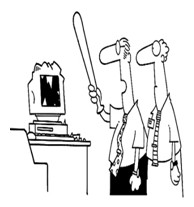『曾经,在课下吸烟、跳舞、不去教堂会让教师丢掉工作;如今,他们会因为在脸谱上发表的言论而被停职,甚至辞退。』
When Teachers Talk Out of School
在教师言论自由的时代
June 3rd 2011 | from The New York Times

IN 1927, a schoolteacher in Secaucus, N.J., named Helen Clark lost her teaching license. The reason? Somebody had seen her smoking cigarettes after school hours. In communities across the United States, that was a ground for dismissal. So was card-playing, dancing and failure to attend church. Even after Prohibition ended, teachers could be dismissed for drinking or frequenting a place where liquor was served.
Today, teachers can be suspended, and even fired, for what they write on Facebook.
Just ask Christine Rubino, the New York City math teacher who may soon be dismissed for posting angry messages about her students. Last June, just before summer vacation began, a Harlem schoolgirl drowned during a field trip to a beach. Ms. Rubino had nothing to do with that incident, but the following afternoon, she typed a quick note on Facebook about a particularly rowdy group of Brooklyn fifth graders in her charge.
“After today, I’m thinking the beach is a good trip for my class,” she wrote. “I hate their guts.”
One of Ms. Rubino’s Facebook friends then asked, “Wouldn’t you throw a life jacket to little Kwami?”
“No, I wouldn’t for a million dollars,” Ms. Rubino replied. She was pulled from the classroom in February and faced termination hearings; the case is now with an arbitrator.
Ms. Rubino’s online outburst was only the latest example of its kind. In April, a first-grade teacher in Paterson, N.J., was suspended for writing on her Facebook page that she felt like a “warden” overseeing “future criminals.”
Such teachers have become minor Internet celebrities, lauded by their fans for exposing students’ insolent manners and desultory work habits. Their backers also say that teachers’ freedom of speech is imperiled when we penalize their out-of-school remarks.
But these defenders have it backward. The truly scary restrictions on teacher speech lie inside the schoolhouse walls, not beyond them. And by supporting teachers’ right to rant against students online, we devalue their status as professionals and actually make it harder to protect real academic freedom in the classroom.
Last October, a federal appeals court upheld the dismissal of an Ohio high-school teacher who had asked students to report about books that had been banned from schools and libraries. The exercise wasn’t in the official curriculum, and parents had complained about their children reading some of the banned books.
Three years before that, the courts allowed an Indiana school board to fire a teacher who told her students that she had honked her car horn in support of a rally against the war in Iraq. The reason was the same: she had deviated from the “approved” curriculum.
Meanwhile, in Wisconsin and elsewhere, state legislatures are moving to restrict or eliminate teachers’ collective bargaining rights. That means unions will have a more difficult time defending teachers’ freedom of speech.
So the rest of us need to make a fresh case for why teachers should have this freedom. And the answer starts, paradoxically, with the limits they should impose on themselves.
All professionals restrict their own speech, after all, reflecting the special purposes and responsibilities of their occupations. A psychologist should not discuss his patients’ darkest secrets on a crowded train, which would violate the trust and confidence they have placed in him. A lawyer should not disparage her clients publicly, because her job is to represent them to the best of her ability.
And a teacher should not lob gratuitous barbs at her students, which contradicts her own professional duty: to teach the skills and habits of democracy. Yes, teachers have a responsibility to transmit the topics and principles of the prescribed curriculum. But they also need to teach democratic capacities — including reason, debate and tolerance — so our children learn to think on their own.
Teachers won’t be able to model those skills if our schools and courts continue to muzzle them. But the same democratic imperative also demands that teachers responsibly restrict what they say, just as other professionals do.
热门推荐:
考研网校哪个好
新东方考研培训班
考研培训班
考研培训机构哪个好
考研英语网络课程
文都考研网校
北京考研培训班

